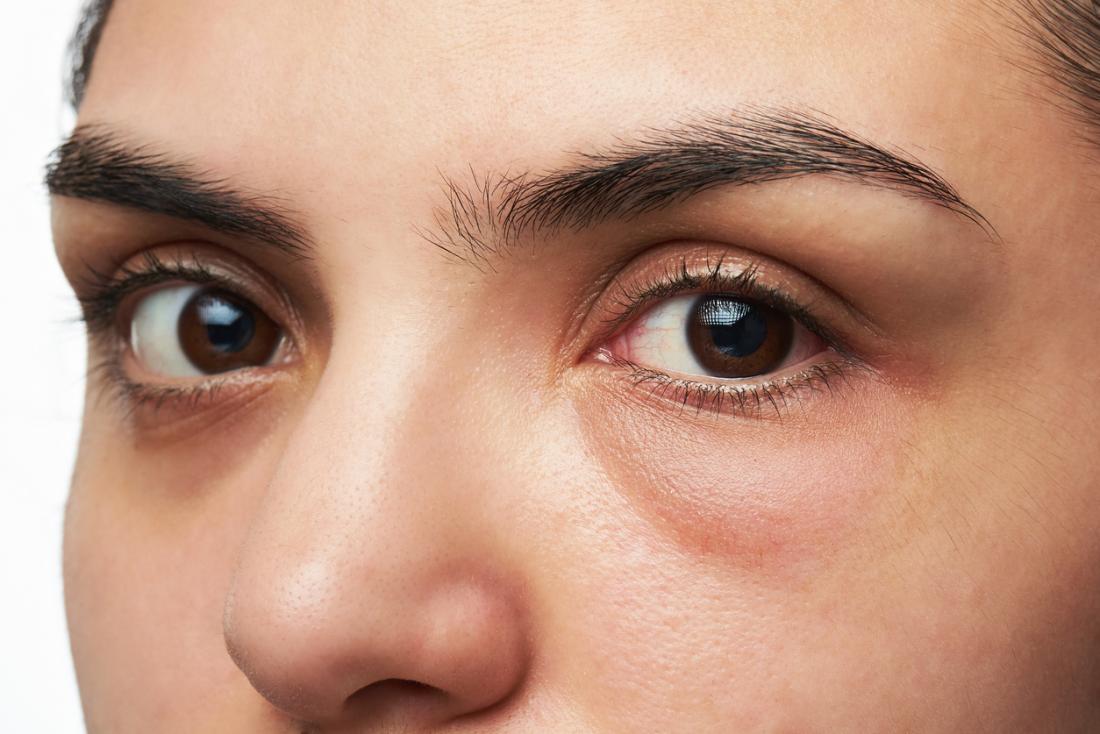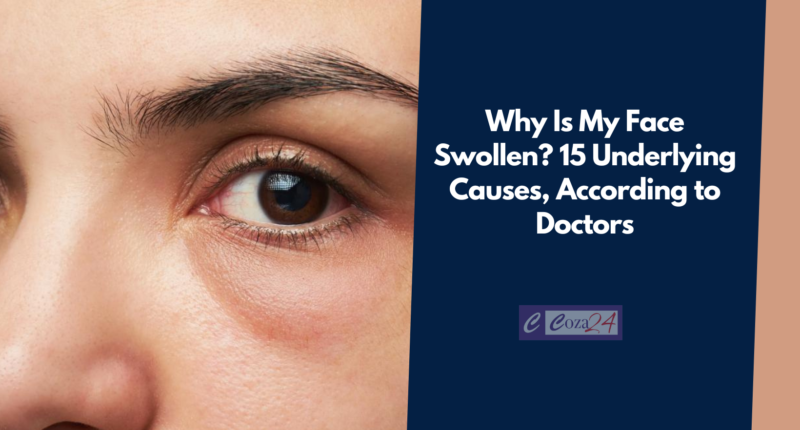Find out “Why Is My Face Swollen?” If you’ve ever woken up to find your face swollen, you’re not alone. Facial swelling can be a concerning and uncomfortable experience, and it’s essential to understand the underlying causes. While facial swelling can occur for various reasons, ranging from mild to severe, it’s crucial to identify the cause to determine the appropriate course of action. In this article, we will explore 15 potential underlying causes of facial swelling, as explained by doctors.

Table of Contents
- 1 15 Underlying Causes, According to Doctors
- 2 Allergic Reactions
- 3 Sinus Infections
- 4 Dental Issues
- 5 Facial Trauma
- 6 Angioedema
- 7 Cellulitis
- 8 Salivary Gland Disorders
- 9 Thyroid Problems
- 10 Kidney Disease
- 11 Liver Disease
- 12 Medications and Side Effects
- 13 Lymphedema
- 14 Autoimmune Diseases
- 15 Facial Edema during Pregnancy
- 16 Conclusion
- 17 FAQs
- 17.0.0.1 1. How long does facial swelling usually last?
- 17.0.0.2 2. Can facial swelling be a sign of a serious medical condition?
- 17.0.0.3 3. Are there any home remedies to reduce facial swelling?
- 17.0.0.4 4. When should I seek immediate medical attention for facial swelling?
- 17.0.0.5 5. Can facial swelling be prevented?
- 17.0.0.6 6. Should I be concerned about facial swelling during pregnancy?
15 Underlying Causes, According to Doctors
Facial swelling, also known as facial edema, refers to the enlargement or puffiness of the face caused by fluid accumulation. It can affect different areas of the face, including the cheeks, eyes, lips, or entire face. While occasional mild swelling may not be a cause for concern, persistent or severe facial swelling should be evaluated by a healthcare professional. Let’s delve into some of the possible reasons behind facial swelling.
Allergic Reactions
Allergic reactions to certain foods, medications, insect bites, or environmental triggers can lead to facial swelling. This condition is known as angioedema, and it typically affects the lips, eyes, and cheeks. In severe cases, it can also cause difficulty breathing. Seeking immediate medical attention is crucial if you suspect an allergic reaction.
Sinus Infections
Sinus infections, such as sinusitis, can result in facial swelling due to inflammation and the accumulation of mucus in the sinus cavities. The swelling usually occurs around the eyes, cheeks, and forehead. Other symptoms may include nasal congestion, headache, and facial pain. Treatment often involves antibiotics and decongestants.
Dental Issues
Problems with your teeth or gums can contribute to facial swelling. Tooth abscesses, gum infections, or impacted wisdom teeth can cause localized swelling in the face and jaw. In such cases, a visit to the dentist is essential to address the underlying dental issue and alleviate the swelling.
Facial Trauma
Any form of facial trauma, such as a blow to the face or a fractured bone, can lead to immediate swelling. Trauma causes inflammation and the release of fluids into the tissues, resulting in facial edema. Seeking medical attention is crucial to rule out any fractures or serious injuries.
Angioedema
Angioedema is a condition characterized by deep swelling beneath the skin’s surface, often affecting the face and lips. It can occur due to an allergic reaction, genetic factors, or certain medications. The swelling typically subsides within 24 to 48 hours, but it’s important to identify the underlying cause and manage it accordingly.
Cellulitis
Cellulitis is a bacterial skin infection that can cause facial swelling, redness, warmth, and tenderness. It occurs when bacteria enter the skin through a cut, wound, or insect bite. Prompt medical treatment with antibiotics is necessary to prevent the infection from spreading and alleviate facial swelling.
Salivary Gland Disorders
Disorders of the salivary glands, such as sialadenitis or salivary gland stones, can lead to facial swelling, particularly around the jaw and cheeks. These conditions result from inflammation or blockages in the salivary glands, causing pain and swelling. Treatment may involve antibiotics, pain relief medications, warm compresses, or, in some cases, surgical intervention.
Thyroid Problems
Imbalances in thyroid hormone levels can contribute to facial swelling. Both an underactive thyroid (hypothyroidism) and an overactive thyroid (hyperthyroidism) can cause fluid retention and lead to puffiness in the face. Managing thyroid conditions with appropriate medication and lifestyle changes can help reduce facial swelling.
Kidney Disease
Kidney disease can cause fluid retention and lead to facial swelling, often accompanied by swelling in other parts of the body, such as the legs and ankles. When the kidneys are not functioning properly, excess fluid and waste products can build up, resulting in edema. Managing kidney disease involves a comprehensive treatment plan, including medication, dietary adjustments, and lifestyle modifications.
Liver Disease
Liver disease, such as cirrhosis or hepatitis, can cause facial swelling due to fluid retention. When the liver is damaged, it may struggle to process fluids efficiently, leading to edema in various parts of the body, including the face. Treating the underlying liver condition and adopting a liver-friendly lifestyle can help manage facial swelling.
Medications and Side Effects
Certain medications, such as corticosteroids, nonsteroidal anti-inflammatory drugs (NSAIDs), and some blood pressure medications, can cause facial swelling as a side effect. If you notice facial swelling after starting a new medication, it’s essential to consult your healthcare provider, who can adjust your dosage or prescribe an alternative medication. (NHS)
Lymphedema
Lymphedema is a condition characterized by the accumulation of lymphatic fluid, leading to swelling in various parts of the body, including the face. It can occur as a result of damage or blockage in the lymphatic system, often due to cancer treatments or infections. Managing lymphedema involves a combination of therapies, including compression garments, manual lymphatic drainage, and exercise.
Autoimmune Diseases
Certain autoimmune diseases, such as lupus or rheumatoid arthritis, can cause facial swelling as a result of inflammation and immune system dysfunction. These conditions may affect the connective tissues and blood vessels, leading to facial edema. Treatment typically involves a multidisciplinary approach, including medication, lifestyle changes, and regular monitoring by healthcare professionals.
Facial Edema during Pregnancy
Facial swelling is a common occurrence during pregnancy, often referred to as pregnancy edema. Hormonal changes, increased blood volume, and fluid retention can contribute to facial swelling in expectant mothers. However, it’s important to monitor the severity of swelling and consult with a healthcare provider to rule out any underlying complications.
Conclusion
Facial swelling can be attributed to various underlying causes, ranging from allergic reactions and infections to systemic diseases and hormonal changes. Identifying the specific cause of facial edema is crucial in determining the appropriate treatment. If you experience persistent or severe facial swelling, it’s important to consult with a healthcare professional for an accurate diagnosis and personalized care.
FAQs
1. How long does facial swelling usually last?
The duration of facial swelling depends on the underlying cause. It can range from a few hours to several days or weeks, depending on the severity and treatment.
2. Can facial swelling be a sign of a serious medical condition?
Yes, facial swelling can be a sign of a serious medical condition. While mild and temporary swelling may not be cause for alarm, persistent or severe facial swelling should be evaluated by a healthcare professional to rule out any underlying health issues.
3. Are there any home remedies to reduce facial swelling?
There are some home remedies that may help reduce facial swelling, such as applying a cold compress, elevating the head while sleeping, staying hydrated, and avoiding salty foods. However, it’s important to consult with a healthcare professional for proper diagnosis and guidance.
4. When should I seek immediate medical attention for facial swelling?
You should seek immediate medical attention if facial swelling is accompanied by difficulty breathing, hives, severe pain, or if it occurs after a severe injury or allergic reaction. These symptoms may indicate a medical emergency.
5. Can facial swelling be prevented?
Preventing facial swelling depends on the underlying cause. For example, avoiding known allergens, practicing good oral hygiene, and managing chronic conditions like kidney or liver disease can help reduce the risk of facial swelling. However, some causes, such as facial trauma, may be unavoidable.
6. Should I be concerned about facial swelling during pregnancy?
Facial swelling during pregnancy is common, but it’s important to monitor the severity and consult with a healthcare provider. Excessive or sudden swelling accompanied by other symptoms like high blood pressure or headaches may indicate a more serious condition, such as preeclampsia.
Also Read | 12 Promising Health Benefits Of The Nutritious Durian Fruit









